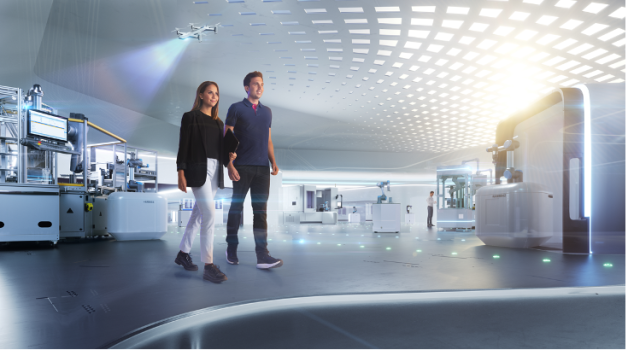Artificial intelligence (AI) is becoming one of the most important enablers of autonomous systems. But in order to become more widely used, it has to be industrial-grade.
The message was startling: “Porsche’s electric Taycan overtakes the classic 911.” That headline appeared in October 2021 in the German weekly Der Spiegel. At that time, Porsche had sold 28,640 Taycan models in a year—about 700 more than the flagship 911, which the carmaker has produced in quantities reaching millions over the course of six decades and eight generations of models. The electric Taycan appeared only two years ago and is decidedly unusual for a sports car, with its electric drive, roominess, and floor covering made of recycled fishnets.
But what was most unusual was the planning and implementation of production. There wasn’t enough space at the Zuffenhausen headquarters for the new production facilities. Manufacturing had to be extremely flexible to quickly respond to changes and custom requirements. There also had to be a significant reduction in carbon emissions and resource consumption. Established methods weren’t sufficient.
So Porsche dared to take a revolutionary step: it abandoned the assembly line. Instead, mobile automated guided vehicles (AGVs) convey the Taycans to various workstations on multiple floors, based on the equipment required. The time from the initial planning of the plant to production of the first car took a mere four years.
Continue reading: https://hbr.org/sponsored/2021/12/how-ai-is-enabling-self-learning-factories
The message was startling: “Porsche’s electric Taycan overtakes the classic 911.” That headline appeared in October 2021 in the German weekly Der Spiegel. At that time, Porsche had sold 28,640 Taycan models in a year—about 700 more than the flagship 911, which the carmaker has produced in quantities reaching millions over the course of six decades and eight generations of models. The electric Taycan appeared only two years ago and is decidedly unusual for a sports car, with its electric drive, roominess, and floor covering made of recycled fishnets.
But what was most unusual was the planning and implementation of production. There wasn’t enough space at the Zuffenhausen headquarters for the new production facilities. Manufacturing had to be extremely flexible to quickly respond to changes and custom requirements. There also had to be a significant reduction in carbon emissions and resource consumption. Established methods weren’t sufficient.
So Porsche dared to take a revolutionary step: it abandoned the assembly line. Instead, mobile automated guided vehicles (AGVs) convey the Taycans to various workstations on multiple floors, based on the equipment required. The time from the initial planning of the plant to production of the first car took a mere four years.
Continue reading: https://hbr.org/sponsored/2021/12/how-ai-is-enabling-self-learning-factories

